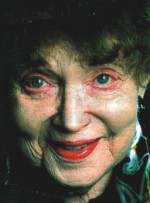|
Obituary
 Dame Muriel Spark Dame Muriel Spark
Dame Muriel Spark was one of the liveliest and most original literary talents to be discovered in Britain since the end of World War II. Success came to her suddenly, after a long period of obscurity and near-poverty.
Muriel Sarah Camberg, as she was born in Edinburgh in February 1918, was the only daughter of a Jewish father and an Episcopalian mother. She was educated at the city's James Gillespie's High School for Girls, where she thrived while studying English, French, Chemistry, Greek, Physics, Latin and Logic.
After training as a secretary, she travelled to Cape Town in 1937. She married, and divorced, at an early age, and lived for a time in Southern Rhodesia.
 In 1944, she undertook a hazardous sea journey from Africa to Britain, having left her young son behind. In a bombed-out London, though she was determined to become a professional writer, Dame Muriel worked in intelligence, producing political propaganda. In 1944, she undertook a hazardous sea journey from Africa to Britain, having left her young son behind. In a bombed-out London, though she was determined to become a professional writer, Dame Muriel worked in intelligence, producing political propaganda.
At the end of World War II she took an office job to get by but wrote voraciously: short stories, novels and poems. This led her to become the editor of The Poetry Review for two years.
During this time, she had a famous row with the Poetry Society's Vice President, the birth-control pioneer, Dr Marie Stopes, who constantly questioned Dame Muriel about her recent divorce.
Her breakthrough came in 1951, when she won the Observer Short Story competition with an African fable with spiritual overtones entitled The Seraph and the Zambezi.
She converted to Catholicism in 1954, after having passed over Anglicanism as not being a sufficiently old enough tradition. Britain's most renowned Catholic writers, Graham Greene and Evelyn Waugh, gave her both encouragement and monetary support.
She cut her teeth on a number of critical and biographical studies of Emily Bronte, Mary Shelley and John Masefield. But it was not until 1957 that she published The Comforters, the first of the novels that, in a very short time, were to make her reputation and her fortune.
The work, the story of a woman, newly converted to Catholicism, who believes her life is being written out on a ghostly typewriter, brought Dame Muriel critical acclaim and a certain financial security. After this initial success, she returned to Edinburgh, in order to write The Prime of Miss Jean Brodie, a highly autobiographical novel, based around her own schooldays.
Jean Brodie wowed the US, being published in its entirety in New Yorker magazine and eventually becoming a Broadway play and an Oscar-winning film, starring Dame Maggie Smith. Even late in life, Dame Muriel Spark had no doubts about the novel, saying, "I still feel it's a charming book."
After a brief sojourn in New York, she moved to Rome in 1968, a spiritual and creative homecoming for a woman who always considered herself, first and foremost, a European.
While living in Rome, she produced seven mesmerising novels. These were often dark, featuring crime, corruption and perverted sex - a chilling new direction for a writer thought of by some as being provincial and twee.
The Rome novels, which included The Driver's seat and the Public Image, were satirical and complex examinations of the, often disturbing, truth behind what are bland outward appearances.
And Dame Muriel had a taste for the macabre, too; one of her most effective stories, Memento Mori, is about old people troubled by a mysterious telephone-caller, reminding them that they must die. She could also be light-hearted, sometimes uproariously funny, especially in her send-up of the Watergate scandal, The Abbess of Crewe, though her humour had a sharp edge, and some critics found it lacking in charity.
Charmingly opinionated, she berated 'timid' writers, complaining that "A book without judgement is not a book."
This article was first published in Bbnews.com. Spark, Britan's one of the leading post-war writers died last week.
Copyright
(R) thedailystar.net 2005 |
